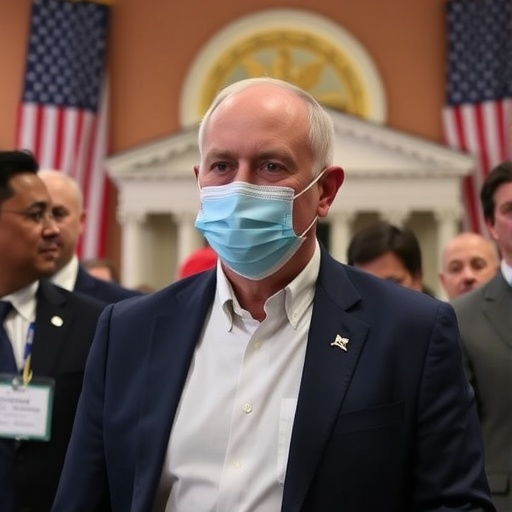Senate Rejects Bill to Secure Pay for Federal Workers During Prolonged Government Shutdown
In a dramatic late-night session that underscored the deep partisan divides in Washington, the Senate failed to advance a bill aimed at ensuring paychecks for hundreds of thousands of federal workers caught in the crossfire of the ongoing government shutdown. The measure, which sought to provide back pay guarantees for essential employees working without compensation, garnered support from unexpected quarters but ultimately crumbled under a procedural hurdle, leaving workers in limbo as the shutdown stretches into its third week.
The vote, which required 60 votes to overcome a filibuster, fell short at 54-46, with three Republicans joining Democrats in a rare show of bipartisanship. Senate Majority Leader Mitch McConnell (R-KY) cited concerns over the bill’s fiscal implications as a key reason for the blockage, while Democrats decried the decision as callous indifference to the human cost of the stalemate. This failure not only highlights the entrenched gridlock in Congress but also amplifies the urgency of resolving the shutdown, triggered by disputes over border security funding.
Bipartisan Push Crumbles Under Filibuster Pressure
The bill in question, formally known as the Federal Employee Retroactive Pay Act of 2023, was introduced by a coalition of senators from both parties in a bid to address the immediate hardships faced by federal workers. Sponsored primarily by Sen. Susan Collins (R-ME) and co-sponsored by Sen. Mark Warner (D-VA), the legislation would have mandated retroactive pay for all furloughed and working-without-pay employees once the shutdown ends. Proponents argued it was a non-controversial measure, separate from the underlying budget disputes fueling the impasse.
During the floor debate, Sen. Collins passionately defended the bill, stating, “These are not political pawns; they are dedicated public servants keeping our nation running. Denying them pay during a shutdown we all hope will end soon is simply inhumane.” Her words resonated across the aisle, drawing support from Sens. Lisa Murkowski (R-AK) and Mitt Romney (R-UT), who crossed party lines to vote yes. On the Democratic side, nearly the entire caucus backed the measure, with Sen. Chuck Schumer (D-NY) slamming the Republican leadership for prioritizing ideology over people.
Despite the crossover votes, the filibuster tactic employed by a bloc of conservative Republicans proved insurmountable. Sen. Rand Paul (R-KY), a vocal opponent, argued that the bill would set a dangerous precedent by “rewarding inefficiency in government spending.” He and allies like Sen. Mike Lee (R-UT) held firm, insisting that any pay guarantees should be tied to broader spending reforms. The procedural vote’s failure means the bill is effectively dead for now, though advocates vow to revive it in the House.
Behind the scenes, negotiations were fraught with tension. Sources familiar with the discussions revealed that McConnell’s office had privately signaled openness to amendments but ultimately instructed GOP senators to vote against cloture, preserving leverage in shutdown talks. This maneuver has drawn sharp criticism from budget experts, who note that previous shutdowns in 2013 and 2018-2019 also saw similar pay protection efforts stall initially before bipartisan compromises emerged.
Federal Workers Bear the Brunt: Personal Stories Emerge
As the shutdown drags on, the real-world toll on federal workers has become increasingly vivid. Over 800,000 employees across agencies like the FBI, TSA, and IRS are either furloughed or working without pay, according to the Office of Personnel Management. For many, this isn’t just a temporary inconvenience—it’s a financial catastrophe. In a poignant op-ed published in The Washington Post, a TSA screener from Virginia shared how she’s rationing groceries and delaying medical treatments to make ends meet.
Consider the case of Maria Gonzalez, a 45-year-old Smithsonian curator in Washington, D.C., who has worked at the National Museum of Natural History for 18 years. Furloughed since the shutdown began on December 22, Gonzalez told reporters, “I’ve saved what I can, but with Christmas behind us and bills piling up, I’m borrowing from family just to keep the lights on. This bill could have been a lifeline.” Her story is echoed by thousands: a Government Accountability Office report estimates that the average federal worker loses about $1,200 per week during a shutdown, exacerbating economic strain in communities reliant on government jobs.
In affected regions, the ripple effects are stark. Around the nation’s capital, small businesses report a 15-20% drop in revenue as federal workers cut back on dining and shopping. A survey by the National Treasury Employees Union found that 40% of respondents have already dipped into savings, while 25% are considering high-interest loans. For essential workers like air traffic controllers and border patrol agents, the psychological burden is compounded by the requirement to report to duty without compensation— a situation decried as modern-day indentured servitude by labor advocates.
Statistics paint a broader picture: The Partnership for Public Service calculates that the current shutdown is the longest in U.S. history, surpassing the 35-day record from 2018-2019. During that episode, Congress eventually passed back pay for all affected workers, but the delay led to widespread financial distress, including increased bankruptcies and foreclosures among federal employees. This time, with holiday spending already depleted, experts warn of even graver consequences if the impasse persists.
Shutdown Roots: Border Wall Funding at the Epicenter
The Senate’s rejection of the pay bill cannot be viewed in isolation from the shutdown’s origins. Sparked by President Donald Trump’s demand for $5.7 billion in funding for a southern border wall, the standoff has paralyzed Congress since late December. House Democrats, who control the chamber, passed spending bills multiple times without wall provisions, only to see them stall in the Republican-led Senate. McConnell has conditioned any vote on White House approval, creating a vicious cycle of inaction.
Key flashpoints include the wall’s cost-effectiveness and necessity. The Congressional Budget Office projects that full wall construction could exceed $25 billion, with dubious returns on immigration control. Democrats, led by House Speaker Nancy Pelosi, have offered compromises like increased funding for technology-based border security, but Trump has rejected them as insufficient. In a recent tweet, the president reiterated, “No wall, no deal—America’s safety demands it.”
Economically, the shutdown’s cost is mounting. The Council of Economic Advisers estimates daily losses at $1.2 billion to the U.S. economy, including delayed IRS tax refunds and halted national park operations. Federal workers, numbering over 2.1 million civilian employees, represent a significant portion of this workforce, with many in high-cost areas like California and New York facing acute pressures from rising living expenses.
Historical parallels abound: The 1995-1996 shutdowns, lasting 21 days combined, led to public backlash that forced a budget deal. Yet today’s polarized environment, amplified by social media and 24-hour news cycles, has hardened positions. Polling from Pew Research shows 53% of Americans blame Trump and Republicans for the shutdown, with support for the wall at historic lows of 38%.
Expert Voices: Economists and Lawmakers React to the Defeat
The Senate’s decision has elicited a chorus of reactions from stakeholders. Maya MacGuineas, president of the Committee for a Responsible Federal Budget, called the vote a missed opportunity for compassion, warning that prolonged uncertainty could trigger a broader recession. “Federal workers are the backbone of our government; treating them as afterthoughts undermines public trust,” she said in an interview with CNN.
Lawmakers on both sides weighed in. Rep. Alexandria Ocasio-Cortez (D-NY) tweeted, “This is what happens when one party’s extremism holds the American people hostage. We need to end this shutdown now.” Meanwhile, Sen. Lindsey Graham (R-SC), a Trump ally, defended the leadership’s stance, arguing that linking pay to shutdown resolution incentivizes negotiation. However, even some Republicans expressed frustration; Sen. Cory Gardner (R-CO) told Fox News, “We can’t let good policy die because of politics—federal workers deserve better.”
Labor unions have mobilized, with the American Federation of Government Employees organizing rallies in D.C. and virtual petitions garnering over 100,000 signatures. Legal challenges are also brewing: The National Labor Relations Board is fielding complaints from workers alleging unfair labor practices, potentially leading to lawsuits against the government.
From an SEO perspective, searches for “government shutdown impact on federal workers” have surged 300% in the past week, per Google Trends, reflecting public anxiety. Analysts predict that media coverage will intensify, pressuring Congress to act.
Path Forward: Negotiations Heat Up Amid Growing Pressure
With the pay bill thwarted, eyes now turn to potential breakthroughs in shutdown talks. House Democrats are preparing a slimmed-down funding package, excluding wall money but including disaster relief for hurricane-hit areas—a move that could peel off moderate Republicans. Trump has hinted at flexibility, telling reporters aboard Air Force One, “I’m open to deals that secure the border, but Democrats must come to the table.”
Advocates for federal workers aren’t giving up. Sen. Collins announced plans to reintroduce the pay bill in the new year, possibly attaching it to must-pass legislation like the farm bill extension. Bipartisan working groups in the Senate are quietly meeting, with sources indicating progress on a compromise that might allocate $1.6 billion for border barriers in exchange for reopening the government.
Looking ahead, the implications are profound. If the shutdown extends into February, it could disrupt tax season, delay Social Security payments, and strain military readiness. Economists from the Brookings Institution forecast a 0.5% hit to first-quarter GDP growth. For federal workers, community support networks are expanding—food banks in D.C. report a 50% uptick in demand from government employees.
Ultimately, resolving this crisis will test the mettle of Congress and the White House. As public frustration mounts— with approval ratings for both parties dipping below 40%—the pressure for a deal intensifies. Federal workers, the unsung heroes of daily governance, wait in the wings, their paychecks hanging in the balance of political theater.








